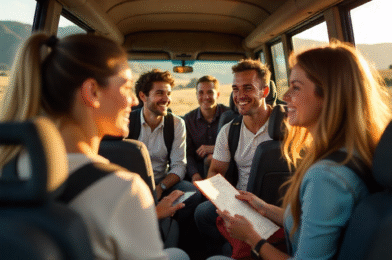You’ve done the research, you’ve raised the support, and you’ve committed to the journey. The excitement for your volunteer trip is building every day. Then, you book the flight, and it all becomes incredibly real. You look at the itinerary: a 12-hour flight, a 5-hour layover, another 6-hour flight. Suddenly, a new set of questions and anxieties begins to surface.
The journey to your volunteer destination is more than just a means to an end; it’s a significant undertaking that requires its own dedicated preparation. A smooth, well-planned travel experience doesn’t just reduce your stress; it ensures you arrive healthy, energized, and ready to give your best to the community you’ve come to serve. A bumpy start can leave you exhausted and overwhelmed before your real work even begins.
Think of this guide as your co-pilot. We will walk you through everything you need to know for your long-distance volunteer travel, from the critical pre-flight planning to in-flight survival strategies and how to gracefully navigate your first 24 hours on the ground.
Part 1: Pre-Flight Checklist — Setting Yourself Up for Success
Great travel days are born from great preparation. The work you do in the weeks and days before you leave is the most important factor in ensuring a smooth journey.
Booking Smart for the Long Haul
When you have the flexibility, be strategic with your flight booking.
- Look for Value, Not Just Price: The cheapest flight with two short, frantic layovers might not be the best choice. Sometimes paying slightly more for a longer, more relaxed layover where you can stretch and eat a proper meal is worth its weight in gold.
- Travel with Your Team: If you are going with a group, try to book flights together or at least with similar arrival times. Arriving in a new country is much less intimidating when you have a buddy.
- Consider Your Arrival Time: If possible, choose a flight that arrives during the daytime. Navigating a new city and finding your transport is significantly easier and safer in the light of day than in the middle of the night.
Your Documents: The Non-Negotiables
Your documents are your passport to the world. Treat them like gold.
- Check Your Passport: Ensure your passport is valid for at least six months after your planned return date. Many countries will deny you entry if it’s not.
- Visas and Invitations: Confirm the visa requirements for your destination country well in advance. Have a printed copy of your visa and a letter of invitation from your volunteer organization.
- Create Digital and Physical Copies: Scan or take photos of your passport, visa, flight itinerary, travel insurance, and driver’s license. Email them to yourself and save them to a cloud service (like Google Drive). Also, make a few physical photocopies to keep in a separate bag from the originals.
Packing Your Carry-On with Purpose
Your carry-on is your survival kit. If your checked bag gets lost, your carry-on should have everything you need to survive for a couple of days.
- A Full Change of Clothes: Pack a complete outfit, including underwear and socks. After 24 hours of travel, a fresh set of clothes will make you feel human again.
- Essential Toiletries: A toothbrush, toothpaste, deodorant, face wipes, and any other can’t-live-without items in travel-sized containers.
- All Medications: Never pack essential medications in your checked luggage. Keep them in their original prescription bottles. Include basic pain relievers, motion sickness medication, and any stomach aids.
- Power and Entertainment: A fully charged power bank is non-negotiable. Download movies, podcasts, and music to your devices before you leave home.
- Comfort Kit: A good neck pillow, an eye mask, and earplugs or noise-canceling headphones can be the difference between a miserable flight and a restful one.
- Reusable Water Bottle (Empty!): You can fill it up at a fountain after you clear security. Hydration is key.
Part 2: In-Flight Strategy — Thriving at 35,000 Feet
You’ve made it onto the plane. Now, how do you endure the long hours and arrive feeling your best?
Hydration is Your Superpower
The recycled, dry air in an airplane cabin is incredibly dehydrating. Dehydration worsens jet lag, causes headaches, and lowers your immunity.
- Drink Water Constantly: Don’t wait until you’re thirsty. Fill up your reusable bottle and sip it throughout the flight.
- Limit Dehydrating Drinks: Go easy on the caffeine and alcohol. They will disrupt your sleep and dehydrate you further. Opt for water or herbal tea instead.
The Battle Against Jet Lag Starts Now
As soon as you board the plane, set your watch and your phone to your destination’s time zone. This simple mental trick begins the acclimatization process.
- Sleep on Their Schedule: Try to sleep when it’s nighttime at your destination. Use your eye mask and earplugs to block out the cabin noise and light.
- Stay Awake on Their Schedule: If it’s daytime where you’re going, try to stay awake. Watch a movie, read, or walk around the cabin.
Move Your Body
Sitting for long periods is unhealthy and increases the risk of Deep Vein Thrombosis (DVT), a serious condition involving blood clots.
- Get Up and Walk: At least once every hour, get up, walk the aisles, and do some simple stretches in the galley area.
- Do In-Seat Exercises: Rotate your ankles, flex your feet, and stretch your calves while seated.
Part 3: The Arrival — Navigating Your First 24 Hours
You’ve landed! This is an exciting but potentially overwhelming moment. A calm, methodical approach will make all the difference.
Conquering Customs and Immigration
This can be the most intimidating part. Be prepared. Have all your documents easily accessible in your carry-on—passport, visa, and the address and phone number of your accommodation.
- Be Honest and Clear: When the immigration officer asks the purpose of your visit, be honest. Use the word “volunteer” and have your invitation letter from your host organization ready to show them.
- Declaring Donated Items: If you are carrying a large number of donated items in your luggage, have a letter from your organization on official letterhead explaining that the items are donations for their charitable work. This can help avoid confusion or import taxes.
Your First Encounter with a New Culture
The moment you step outside the airport, you will be hit with a wave of new sounds, smells, and sights. It can be a sensory overload.
- Move Slowly: Don’t rush. Take a moment to just stand and observe.
- Have a Plan: Know exactly how you are meeting your pre-arranged transport. Have the local phone number for your contact person written down. Do not accept rides from unsolicited taxi drivers.
- Money Matters: Avoid the currency exchange kiosks, which have high fees. Instead, use an official bank ATM inside the airport to withdraw a small amount of local currency to get you started.
The Golden Rule of Arrival Day
No matter how bone-tired you are from your journey, do everything you can to get on local time immediately.
- Avoid Napping (If It’s Daytime): If you arrive in the morning or afternoon, resist the powerful urge to crawl into bed. A long nap will destroy your chances of sleeping that night and will prolong your jet lag for days.
- Get Outside in the Sunlight: Sunlight is the most powerful signal to your brain to reset your internal clock. Go for a gentle walk, sit in a park, or eat your first meal at an outdoor cafe.
- Stay Awake Until a Reasonable Local Bedtime: Push through until at least 9:00 PM local time. This will help ensure you sleep through the night and wake up feeling refreshed and on schedule the next day.
Your long-distance journey is the first act of your mission. By preparing thoughtfully, you honor your commitment, you care for your own well-being, and you position yourself to arrive as the best possible version of a volunteer: rested, ready, and eager to serve.
What’s your number one must-have item in your carry-on for a long-haul flight? Share your best travel tip in the comments below!


